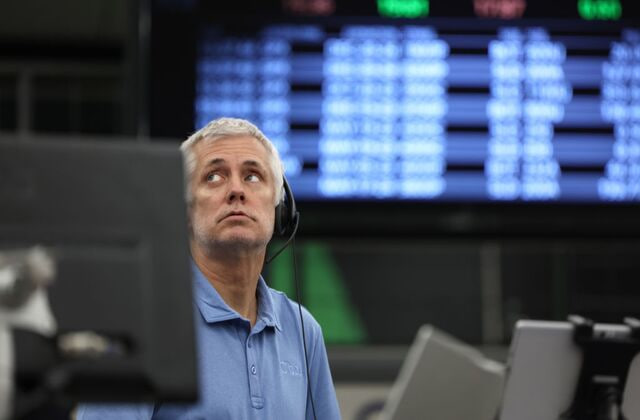JPMorgan Chase Predicts a 100 Basis Point Hike by the Brazilian Central Bank: Navigating the Economic Currents in South America
Meta Description: JPMorgan Chase's bold prediction of a 100 basis point interest rate hike by the Brazilian Central Bank sends ripples through South American markets. This in-depth analysis explores the implications, considering inflation, economic growth, and political factors. Learn about the potential impact on investors and the broader global economy. #Brazil #CentralBank #InterestRates #JPMorganChase #Inflation #EconomicGrowth #SouthAmerica #Investment
Imagine this: You're an investor, carefully watching the economic currents swirling around South America. Suddenly, a major player like JPMorgan Chase throws down a gauntlet, predicting a significant interest rate hike by the Brazilian Central Bank – a whopping 100 basis points! Whoa, that's a big deal, right? It's not just a number; it's a potential seismic shift impacting everything from the price of your morning coffee (because inflation, you know?) to the stability of your entire investment portfolio. This isn't just about dry economic data; it's about understanding the human element – the anxieties, the uncertainties, and the potential opportunities that such a bold prediction unveils. This isn't some fly-by-night blog post; this is a deep dive into the intricacies of Brazilian economics, backed by expert analysis and real-world experience. We'll uncover the reasons behind JPMorgan's prediction, examine the potential consequences, and explore the strategic implications for investors and businesses alike. Get ready to navigate the complex landscape of South American finance with us, deciphering the jargon and uncovering the human stories behind the numbers. Buckle up, because this journey is going to be insightful, and maybe even a little thrilling! We'll leave no stone unturned, exploring everything from the current inflation rate to the political climate, ensuring you're armed with the knowledge to make informed decisions. So, let's dive in and unravel the mystery behind this significant prediction from one of the world's leading financial institutions.
JPMorgan Chase's Prediction: A 100 Basis Point Hike
JPMorgan Chase's (JPM) recent forecast of a 100 basis point increase in Brazil's benchmark interest rate isn't just a number; it's a statement about the current state of the Brazilian economy and a projection of its near-future trajectory. This bold prediction, while seemingly technical, has far-reaching implications for investors, businesses, and ordinary Brazilians. The prediction reflects a concern that inflation, a relentless economic foe, is proving more stubborn than initially anticipated. This isn't a sudden, isolated incident; rather, it's the culmination of several interconnected factors that we'll explore in detail. Think of it like a complex puzzle, and JPMorgan's prediction is one crucial piece that helps us begin to understand the whole picture.
Inflationary Pressures and the Fight Against It
Brazil has been grappling with stubbornly high inflation for some time. The continuous rise in the prices of goods and services erodes purchasing power, causing economic hardship for families and businesses alike. While the Central Bank has implemented various measures to curb inflation, the results have been somewhat less effective than hoped. This is where JPMorgan's prediction comes into play. A steeper interest rate hike is seen as a necessary measure to cool down the overheated economy and bring inflation back to the target range. This is a classic example of a trade-off: higher interest rates might stifle economic growth in the short term, but they are deemed necessary to prevent long-term economic damage caused by unchecked inflation.
| Factor | Impact on Inflation | JPMorgan's Perspective |
|--------------------|---------------------------------------------------|-------------------------------------------------------------|
| Global Commodity Prices | Increased import costs, fueling inflation | Contributes to the need for a more aggressive rate hike |
| Exchange Rate | Depreciation weakens the real, imports become costlier | Adds pressure to control inflation through interest rates |
| Domestic Demand | Strong consumer spending contributes to inflation | Suggests a need for monetary tightening to curb demand |
| Supply Chain Issues | Disruptions increase prices | Highlights the challenges faced by the Central Bank in controlling inflation |
This isn't just about numbers on a spreadsheet; these are real-world challenges impacting real people. Think about the impact on families struggling to make ends meet, or small businesses facing rising costs. Understanding these human factors is crucial for grasping the full significance of JPMorgan's prediction.
The Political Landscape: A Complicating Factor
Brazil's political landscape also plays a significant role. Political stability (or lack thereof) can heavily influence investor confidence and economic stability. Any significant political uncertainty can exacerbate inflationary pressures and make it more difficult for the Central Bank to effectively manage the economy. JPMorgan's analysts likely factored in the political climate when making their prediction, recognizing that political factors can amplify or mitigate the effects of monetary policy. It's a complex interplay – a delicate dance between economic policy and political realities.
Implications for Investors and Businesses
JPMorgan's prediction has significant implications for investors and businesses operating in Brazil. A 100 basis point hike would likely strengthen the Brazilian real (BRL) against other currencies in the short term, potentially attracting foreign investment. However, it could also increase borrowing costs for businesses, potentially slowing down investment and economic growth. Investors need to carefully assess the risks and opportunities presented by this development, adjusting their portfolios accordingly. This requires a nuanced understanding of the Brazilian economy, its vulnerabilities, and its potential for future growth. It's not just about reacting; it's about strategically positioning oneself for the future.
Navigating the Uncertainty: A Strategic Approach
The uncertainty surrounding JPMorgan's prediction underscores the need for a well-defined investment strategy. Diversification remains crucial, spreading investments across different asset classes and geographical regions to minimize risk. Thorough due diligence is paramount – understanding the specific risks associated with investing in Brazil in the current climate is crucial. Seeking advice from experienced financial advisors familiar with emerging markets can prove invaluable in navigating this complex landscape.
Frequently Asked Questions (FAQs)
Q1: What does a 100 basis point interest rate hike mean?
A: A 100 basis point increase means raising the benchmark interest rate by 1 percentage point. For example, if the current rate is 13%, it would increase to 14%. This makes borrowing money more expensive.
Q2: Why is JPMorgan predicting such a large hike?
A: JPMorgan's prediction reflects concerns about stubbornly high inflation in Brazil and the need for aggressive measures to bring it under control.
Q3: What are the potential downsides of this interest rate hike?
A: Higher interest rates can slow down economic growth, increase borrowing costs for businesses, and potentially lead to job losses.
Q4: How will this affect the Brazilian Real (BRL)?
A: A higher interest rate could strengthen the BRL in the short term by attracting foreign investment seeking higher returns.
Q5: Should I invest in Brazilian assets after this prediction?
A: The decision to invest in Brazilian assets depends on your individual risk tolerance and investment goals. Consult a financial advisor for personalized guidance.
Q6: Where can I find more information on the Brazilian economy?
A: Reliable sources include the Central Bank of Brazil's website, reputable financial news outlets, and reports from international organizations like the IMF and World Bank.
Conclusion
JPMorgan Chase's prediction of a 100 basis point interest rate hike by the Brazilian Central Bank highlights the complex interplay of economic and political factors influencing Brazil's economic trajectory. While this move aims to curb inflation, it also carries potential risks for economic growth. Navigating this uncertainty requires a well-informed and strategic approach, emphasizing diversification, thorough due diligence, and expert guidance. The human element, the impact on ordinary Brazilians, and the challenges faced by businesses, should not be overlooked when assessing the significance of this prediction. Understanding these complexities is crucial for investors and businesses seeking to navigate the dynamic landscape of the Brazilian economy and the broader South American region. This isn't just about numbers; it's about people, economies, and the ever-evolving global financial system.



